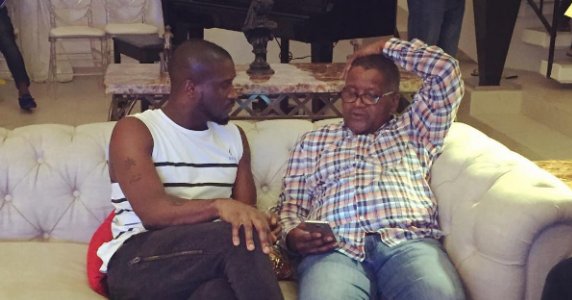This week, more than 138,000 vaccinators will fan out across five African countries in the Lake Chad area in a push to eliminate polio in Africa and rid the world of this terrible disease forever.
They will take boats across fast-flowing rivers, ride jeeps along sandy ravines, walk crowded street in towns and cities and navigate cramped quarters of refugee camps to ensure that every child is immunized. Traveling for hours a day, these dedicated women and men will visit children in homes, schools, train stations, and transit points across Nigeria, Niger, Chad, Cameroon, and the Central African Republic.
This also marks World Immunization Week, a coordinated effort to make sure that people everywhere understand the importance of getting immunized to protect against vaccine-preventable diseases.
And by coincidence, it was almost seven years ago that the two of us first met in a hotel conference room in Abuja, Nigeria’s capital. We were there as part of a diverse group—public officials, religious leaders, business people, polio survivors, and journalists—to discuss how we could work together to stop polio in Nigeria.
At the time, Nigeria had done an amazing job tackling polio—reducing reported cases by 95 percent in just one year. But it was still circulating in six Nigerian states. While 95 percent might seem like success, as long as a single child remains infected, children across Africa and around the world are at risk.
Thanks to the effort of so many, Nigeria’s Borno State is now the only place in Africa today where polio is still circulating. It will take ingenuity to end polio there, and it will take persistence to continue reaching children in the surrounding area with vaccines to protect them from the disease until it is eradicated. But we’re confident it can be done. And when that happens, Africa will celebrate one of the biggest victories ever in public health.
Since our first meeting in 2010, the two of us have worked together on a range of other projects to help improve health in Nigeria and across Africa.
We supported the establishment of emergency operations centers in Nigeria and other countries to keep polio from spreading. This turned out to be a blessing during the 2014 Ebola outbreak in West Africa. When the disease first appeared in Nigeria—an international travel hub that is home to more than 180 million people—the staff of an emergency operations center set up in Lagos jumped into action and stopped the disease in its tracks. It’s almost unimaginable to think what would have happened without them.
In the state of Kano, we are working with the government to ensure that children can get essential childhood immunizations against tetanus, pneumonia, liver cancer and measles. And when parents bring their children into a clinic for vaccinations, health workers can address other health issues, too, like nutrition, care for pregnant mothers and newborns and malaria prevention and treatment. We have since widened the program to several other states.
Vaccines are also one of the best tools to save lives in an epidemic, such as the meningitis C outbreak happening now in Nigeria and other West African countries.
And because of the devastating impact malnutrition has on Nigeria’s children – leading to 300,000 deaths annually and causing stunted growth and development in millions more – we have expanded our partnership to include nutrition programs across 12 states.
Earlier this year, we also helped launch the End Malaria Council, a group of influential public and private sector leaders committed to ensuring that malaria eradication remains a top global priority.
Underlying all these efforts is our belief that strengthening health systems is the key to breaking the cycle of extreme poverty and disease—and kick-starting a virtuous cycle of health, productivity, and prosperity.
In our work together, we have learned a few important lessons.
First, improving the health of communities depends on a successful partnership between government, communities, religious and business leaders, volunteers, and NGOs. This ensures that everyone is rowing in the same direction. And it is essential to building trust so parents have the confidence that vaccines are safe and will protect their children from life-threatening diseases.
Second, we must keep innovating to speed up progress. This month, for example, vaccinators will test a new vaccine carrier that keeps the temperature of vaccines stable for up to five days, even in blistering heat. This breakthrough will enable vaccinators to finally reach children in extremely remote areas with life-saving vaccines.
Last, accurate and reliable data is central to any effort to improve health. Data can tell a health officer which communities are running low on vaccine supplies, where there are gaps in vaccination coverage, and which new mothers need reminders to take their babies to the health clinic to be immunized.
An Africa without polio is within reach. So is the vision of getting life-saving vaccines to every child. Success will generate more enthusiasm and support from across different sectors – government, business, civil society, the media – to tackle other killer diseases and the underlying conditions that affect people’s health, including fixing broken health systems.
We know that strengthening health systems takes time and diligence. We are optimistic that Africa can achieve the future it aspires to. That future depends on people working together—across national borders and across socioeconomic strata—to build the better world we all want.
Psquare hosts Aliko Dangote at their new mansion.
When one of the richest men in the world shows up at your birthday shindig, brethren, it is a big deal; a larger than life deal.
So Africa’s richest man, Aliko Dangote was hosted at Psquare’s birthday and housewarming ceremony which took place few days ago at Banana Island, Ikoyi, Lagos.

The music duo who turned 35 on November 18 shared pictures of the event on their instagram pages.


The low key event was attended by friends, colleagues and family members.
President Muhammadu Buhari, Aliko Dangote, Linda Ikeji others named in100 most influential Africans of 2015 list.
Dangote resigns from Dangote Flour Mills

"I can't join politics cos I only have two hands" -Dangote

I am one of the many people out there who have been wondering why Nigerian billionaire Aliko Dangote has not shown interest in any political position. Adducing reasons for not actively participating in politics,The CEO of Dangote Group stressed that business and politics should never be mixed.
//
Ikenne-Remo, Ogun State, the richest man in Africa said both ventures require different skills.
“We are in the private sector so we should be creating jobs. Government should be creating good policies and also ensuring that we are not taking advantage of the poor.
“During the oil boom, when a barrel of oil sold above 100 dollars, there were too many leakages which the Federal Government is now trying to resolve by plugging them. When this is effectively achieved, I believe the economy will begin to regain its stability.
Aliko Dangote loses adopted daughter to brain cancer
Wole Soyinka, Tinubu, Mo Abudu, others attend Gov. Amaechi's "Dynamics Of Change'' book launch (Photos)
Accomplished writer/author, Prof. Wole Soyinka; top TV host and CEO, Ebony Life TV, Mo Abudu; Ex Governor of Lagos.State and APC Chieftain Bola Tinubu and many more distinguished guests attended Rivers State Governor, Rotimi Amaechi’s book launch.
The book which was titled the “Dynamics of Change: The Amaechi Years” was launched yesterday, Thursday 14th May, 2015 at the Civic Center in Lagos.
The outgoing Rivers State Governor while giving his speech at the event mentioned that he knew he was going to be in trouble if APC had lost the presidential poll.
“I knew I was going to be in trouble. Anything that would cause that change not to take place, I was ready to make that sacrifice. The federal government sent out a signal that if they won nobody should let me out of Nigeria from any airport. One day Asiwaju got angry with me. He was very angry. I went to his house with Mallam Nasir El-Rufai and knelt down, saying ‘please let’s not disagree, let’s win first and then we can disagree’. He added.



